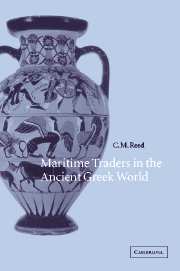Book contents
- Frontmatter
- Contents
- Acknowledgments
- List of abbreviations
- List of references to Greek terms
- Maps
- Introduction
- Chapter 1 Coming to terms
- Chapter 2 Classical modes and patterns of exchange
- Chapter 3 The juridical place of maritime traders
- Chapter 4 The level of wealth of maritime traders
- Chapter 5 Official attitudes towards maritime traders
- Chapter 6 Unofficial attitudes toward maritime traders
- Chapter 7 Archaic modes of exchange and the personnel involved c. 800–475 b.c.
- Chapter 8 Conclusion: then and now
- Appendix 1 Emporoi and nauklēroi: their attested states of origin
- Appendix 2 Cohesion among maritime traders
- Appendix 3 The dikai emporikai
- Appendix 4 Catalogue of emporoi and nauklēroi
- Bibliography
- Index locorum
- General index
Chapter 3 - The juridical place of maritime traders
Published online by Cambridge University Press: 22 September 2009
- Frontmatter
- Contents
- Acknowledgments
- List of abbreviations
- List of references to Greek terms
- Maps
- Introduction
- Chapter 1 Coming to terms
- Chapter 2 Classical modes and patterns of exchange
- Chapter 3 The juridical place of maritime traders
- Chapter 4 The level of wealth of maritime traders
- Chapter 5 Official attitudes towards maritime traders
- Chapter 6 Unofficial attitudes toward maritime traders
- Chapter 7 Archaic modes of exchange and the personnel involved c. 800–475 b.c.
- Chapter 8 Conclusion: then and now
- Appendix 1 Emporoi and nauklēroi: their attested states of origin
- Appendix 2 Cohesion among maritime traders
- Appendix 3 The dikai emporikai
- Appendix 4 Catalogue of emporoi and nauklēroi
- Bibliography
- Index locorum
- General index
Summary
Chapters 3–6 deal with the place of emporoi and nauklēroi both in the states they traded with and in the states they came from. Chapter 3 concerns the maritime trader's juridical place (whether citizen or foreigner where he traded); Chapter 4, his level of wealth relative to others in a polis; Chapter 5, the official polis attitude to traders; and Chapter 6, attitudes of citizens within the polis to traders.
Most of the evidene concerns those trading at Athens. Were they mainly Athenians? Since so much of our information dates from the fourth century, it is best to begin there and then consider separately the evidence from the fifth. The great majority of those trading with Athens in the fourth century appear to be non-Athenians: Aeschines (1.40) casually refers to “the emporoi or other foreigners or citizens…”; and of the sixty-one fourth-century emporoi and/or nauklēroi in the Catalogue only twelve are Athenians trading with Athens. Another revealing piece of evidence is more oblique: the speaker in [Lys.] 22 urges the jury (22.21) to “court” (Χαριεῖσθε) the emporoi who trade with Athens by voting death for the grain dealers, the implication being that if the emporoi are not courted they might take their grain elsewhere. Since one of the Athenian maritime laws (nomoi emporikoi) forbade Athenian citizens and metics to carry grain elsewhere, the speaker must be assuming that emporoi are non-citizen, even non-resident.
- Type
- Chapter
- Information
- Maritime Traders in the Ancient Greek World , pp. 27 - 33Publisher: Cambridge University PressPrint publication year: 2003
- 1
- Cited by



